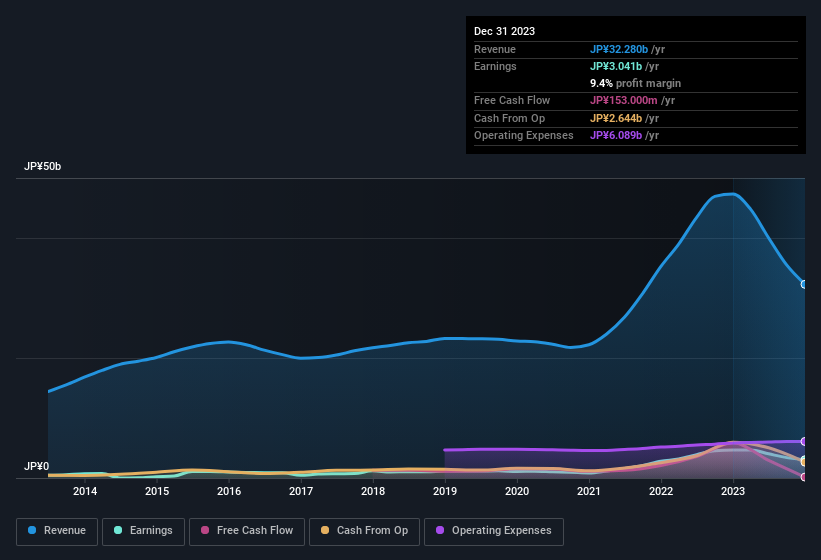- Japan
- /
- Marine and Shipping
- /
- TSE:9384
Naigai Trans Line's (TSE:9384) Weak Earnings May Only Reveal A Part Of The Whole Picture

Naigai Trans Line Ltd.'s (TSE:9384) recent weak earnings report didn't cause a big stock movement. Our analysis suggests that along with soft profit numbers, investors should be aware of some other underlying weaknesses in the numbers.
View our latest analysis for Naigai Trans Line

Examining Cashflow Against Naigai Trans Line's Earnings
Many investors haven't heard of the accrual ratio from cashflow, but it is actually a useful measure of how well a company's profit is backed up by free cash flow (FCF) during a given period. The accrual ratio subtracts the FCF from the profit for a given period, and divides the result by the average operating assets of the company over that time. The ratio shows us how much a company's profit exceeds its FCF.
That means a negative accrual ratio is a good thing, because it shows that the company is bringing in more free cash flow than its profit would suggest. While having an accrual ratio above zero is of little concern, we do think it's worth noting when a company has a relatively high accrual ratio. Notably, there is some academic evidence that suggests that a high accrual ratio is a bad sign for near-term profits, generally speaking.
Naigai Trans Line has an accrual ratio of 0.59 for the year to December 2023. That means it didn't generate anywhere near enough free cash flow to match its profit. Statistically speaking, that's a real negative for future earnings. Indeed, in the last twelve months it reported free cash flow of JP¥153m, which is significantly less than its profit of JP¥3.04b. Naigai Trans Line's free cash flow actually declined over the last year, but it may bounce back next year, since free cash flow is often more volatile than accounting profits. The good news for shareholders is that Naigai Trans Line's accrual ratio was much better last year, so this year's poor reading might simply be a case of a short term mismatch between profit and FCF. Shareholders should look for improved cashflow relative to profit in the current year, if that is indeed the case.
Note: we always recommend investors check balance sheet strength. Click here to be taken to our balance sheet analysis of Naigai Trans Line.
Our Take On Naigai Trans Line's Profit Performance
As we have made quite clear, we're a bit worried that Naigai Trans Line didn't back up the last year's profit with free cashflow. For this reason, we think that Naigai Trans Line's statutory profits may be a bad guide to its underlying earnings power, and might give investors an overly positive impression of the company. But the good news is that its EPS growth over the last three years has been very impressive. The goal of this article has been to assess how well we can rely on the statutory earnings to reflect the company's potential, but there is plenty more to consider. If you'd like to know more about Naigai Trans Line as a business, it's important to be aware of any risks it's facing. For example, we've found that Naigai Trans Line has 2 warning signs (1 is significant!) that deserve your attention before going any further with your analysis.
This note has only looked at a single factor that sheds light on the nature of Naigai Trans Line's profit. But there are plenty of other ways to inform your opinion of a company. Some people consider a high return on equity to be a good sign of a quality business. So you may wish to see this free collection of companies boasting high return on equity, or this list of stocks that insiders are buying.
Valuation is complex, but we're here to simplify it.
Discover if Naigai Trans Line might be undervalued or overvalued with our detailed analysis, featuring fair value estimates, potential risks, dividends, insider trades, and its financial condition.
Access Free AnalysisHave feedback on this article? Concerned about the content? Get in touch with us directly. Alternatively, email editorial-team (at) simplywallst.com.
This article by Simply Wall St is general in nature. We provide commentary based on historical data and analyst forecasts only using an unbiased methodology and our articles are not intended to be financial advice. It does not constitute a recommendation to buy or sell any stock, and does not take account of your objectives, or your financial situation. We aim to bring you long-term focused analysis driven by fundamental data. Note that our analysis may not factor in the latest price-sensitive company announcements or qualitative material. Simply Wall St has no position in any stocks mentioned.
About TSE:9384
Naigai Trans Line
Provides integrated logistics services by ship in Japan, rest of Asia, and internationally.
Flawless balance sheet average dividend payer.
Market Insights
Community Narratives



